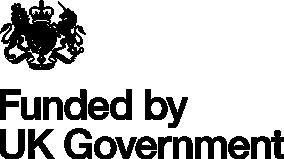

GLOBAL GROWTH REPORT 2025


FOREWORD
Richard Parker, Mayor of the West Midlands
The West Midlands has always been a hub of innovation and enterprise, and in today’s global trading landscape, our businesses are once again outperforming expectations –with the region responsible for 10% of all UK exports.
This report shows how our economic future is closely linked to our ability to trade internationally. For our businesses, exporting is not just a commercial activity; it is a critical engine for growth, fostering innovation and significantly boosting our regional productivity.
Across a range of key sectors, from advanced manufacturing to digital services, the West Midlands is already leading the charge on the world stage. However, we want to do more and my Growth Plan sets out what we need to do to improve that performance and support our growing businesses to create the high value jobs we need to continue competing on the global stage.
Funding provided by the West Midlands Combined Authority (WMCA) is helping to scale up every level of exporter, from businesses taking their first steps, to established companies seeking to enter new markets. This support is tailored to ensure that every business, regardless of size or experience, has the tools and confidence to succeed.
As Mayor, I am personally committed to making the West Midlands a UK leader in international trade. And I am proud to be joined in this through the strong and unique partnership we have between the three West Midlands Chambers of Commerce, the WMCA, and Business Growth West Midlands. This collaboration makes sure decision-makers, funders, and businesses are all pulling in the same direction with the same goal.
We have big plans ahead for our international agenda and will be hosting the first regional investment conference this autumn – setting out our stall as the best place to live, work and do business.

WELCOME
Corin Crane, Chief Executive, Coventry & Warwickshire Chamber of Commerce
The West Midlands continues to be an essential part of the UK economy by exporting incredible products and delivering fantastic services around the world; in 2024, representing 10% of the UK’s exports. However, as the West Midlands Growth Plan argues, this exporting success is led by the high-value goods exports of a very small number of ‘mega-exporters’. To sustain long-term growth in the region, we need to encourage and support SMEs to begin exporting or to expand their international markets for both goods and services.
The Export Support programme’s mission is to enable more companies across the West Midlands to confidently export. The programme targets support to businesses that want to export for the first time, those new to exporting and in their early stages of exporting, as well as those existing exporters that want to explore new markets. It is funded by the West Midlands Combined Authority (WMCA) and is delivered in partnership by the Coventry and Warwickshire, Black Country, and Greater Birmingham Chambers of Commerce, with Business Growth West Midlands.
Why should a business consider exporting? There are many positive reasons for taking the next steps on your exporting journey. By exporting to different markets, businesses can see higher demand and sales growth, with a study by the London School of Economics showing that SMEs can see a 26% increase in profitability when they begin to export. Businesses which export tend to be more productive and more likely to engage in research and development (R&D), through the process of learning from the buyers of their goods and services. This can be from having a wider network of competitors in different markets, allowing firms to offer the best elements of their products, or through learning about different rules and regulations. Exporters are also more resilient from having diversified their customer base.

This report shows that there are so many opportunities out there for businesses, with West Midlands exports reaching into new, growing, and existing markets. The Export Support programme offers 1:1 expert guidance as well as workshops and training. The wonderful comments from businesses that have taken part in the programme are showcased throughout this report, highlighting the tangible benefits of taking part. So, what are you waiting for?
INTRODUCTION
This report was commissioned by the Export Support programme to examine international trade in the West Midlands, with a particular focus on exports. It comes at an exciting moment in time for the region, as various stakeholders consider the role that the West Midlands will play in driving regional and national growth through strategic priorities and key opportunities. The WMCA has recently published its long-term strategy for inclusive growth in the region, the West Midlands Growth Plan Alongside the UK’s Modern Industrial Strategy, published by the UK Government in June 2025, these documents plan ahead for the region and the country respectively. Both identify strategies for economic growth, within which there are specific clusters of focus.
The West Midlands has a long industrial heritage but also huge strengths in R&D and a well-established foundation in modern professional services. The WMCA’s Growth Plan identifies specific sectors that it believes will generate high growth in the coming decade: advanced engineering, light electric vehicles and batteries; clean tech and smart energy systems; health and medical devices, diagnostics and associated digital healthcare; digital, tech and creative; next generation services; and our innovation ecosystem. The Growth Plan also recognises the vital importance of place and what it terms the “everyday economy” for the success of the region. A central tenet of the strategy is that the West Midlands needs to work internationally, both attracting inward investment but also encouraging businesses across the region to consider either beginning to export or diversifying their exporting markets.
As a consequence, this report offers businesses an introduction to key topics in international trade. The first half of the report delves into an array of data covering the West Midlands and the UK more broadly to give a picture of exporting trends since 2020. The data loosely covers the period Q2 2020 to Q2 2025 but is dependent upon the scope of each data source. The second half then builds on this with an overview of recent developments in key markets for the region, based on those identified in the West Midlands Growth Plan, as well as trade barriers and enablers. The last section signposts some of the key avenues of support for businesses who are keen to begin exporting or who want to explore new markets.
A SNAPSHOT OF WEST MIDLANDS EXPORTS1
In 2024, the West Midlands exported £35.2 billion worth of goods across the globe, representing 10% of total UK total exports of £348 billion. Quarterly exports from the West Midlands have grown by over £2.1 billion in nominal terms between Q1 2021 and Q1 2025. In Q1 2021 the trade value was almost £6.6 billion, but grew to over £8.7 billion in Q1 2025. There was sharp growth between Q2 2022 and Q4 2022, with an additional £1.6 billion of exporting trade generated in that period. Further growth in Q4 2023 and Q4 2024 increased the exporting economy of the West Midlands to the value of over £9.4 billion and £9.2 billion respectively, but this dropped slightly at the beginning of 2025, with the region registering £518 million less in exports compared to the previous quarter. In comparison, the national export economy peaked in nominal terms in Q3 2022 at £103.1 billion, contracting to £88.4 billion in Q1 2025, overall seeing nominal growth from Q1 2021 of nearly £17.3 billion. While the West Midlands represented 9.9% of the UK’s export trade in 2025, it saw substantial growth in exports compared to the UK as a whole between Q1 2021 and Q1 2025; while UK exports grew by 24%, exports from the West Midlands grew by 32%.
GLOBAL MARKETS
The largest West Midlands export markets by value in 2024 were:
1. European Union: £14.4 billion
2. North America: £9.3 billion
3. Asia and Oceania: £6.7 billion
4. Middle East and North Africa (excl. EU): £2.1 billion
5. Western Europe (excl. EU): £1.2 billion
6. Eastern Europe (excl. EU): £519 million
7. Latin America and Caribbean: £467 million
8. Sub-Saharan Africa: £391 million
West Midlands Total Value of Export Trade by Country Group in £ millions Q1 2021 - Q1 2025
Value of Trade in £ millions
Asia & Oceania
European Union
Middle East and North Africa (excl EU)
Sub-Saharan Africa
Undefined Country Group
Eastern Europe (excl EU)
Latin America and Caribbean
North America
Western Europe (excl. EU)
The majority of markets have seen an expansion in exporting trade from the UK. To highlight trends in different markets, it is important to explore some case studies:
• The fastest growing market for exports from the West Midlands is the Middle East and North Africa, with exports to those countries more than doubling between 2021 and 2023. From just over £1.1 billion of exports in 2021, the market grew to nearly £2.25 billion in 2023, although this dipped slightly to £2.1 billion in 2024. Total UK exports to this region grew by 46% over the 2021-24 period, so the West Midlands is vastly outpacing the UK as a whole. This growth is driven by the fact countries are rapidly modernising, driving demand for West Midlands sector strengths like automotive, medical devices, and education services, aligned with development goals like Saudi Arabia’s Vision 2030. Although the Middle East and North Africa are currently a long way behind the largest trading partners of the West Midlands in monetary value, the rate of growth makes it a key market to watch.
• Exports to North America from the West Midlands have also grown rapidly, registering 67% growth between 2021 and 2024. For comparison, the UK as a whole registered just 23% growth over the same period. Exports grew in value from £5.5 billion in 2021 to £9.3 billion in 2024; if the strong first quarter of 2025 were to be replicated throughout the year, exports to North America would top £10 billion in value this year. However, turbulence in US markets, including the introduction of increased tariffs on exports, make the replication of this growth in 2025 less certain.
• Other export markets showing strong growth include Asia & Oceania and Latin America and the Caribbean Exports to both these regions from the West Midlands have grown by more than a third between 2021 and 2024 (44% and 36% respectively). While the West Midlands is slightly behind the total UK percentage growth for Latin America and the Caribbean, which grew by 39% nationally, there is clearly the potential and demand for further growth. However, the West Midlands grew much more quickly than the UK as a whole in Asia & Oceania, as the UK registered only 10% growth in 2024 to that region.
The data shows that the West Midlands is successfully growing its exports in most regions across the globe.

Peter Sully, Founder and Managing Director, Spur Shelving
Being able to use the adviser’s expertise and experience under the Exporting Starts Here programme has been really beneficial in so many ways. It has helped to build the business, and our discussions have covered everything including export sales and marketing, global IP protection, brand rebuilding and documentation. The programme has also helped us to convert orders and enquiries. Our first order is going to Qatar now, with some for other international markets in the pipeline.
CATEGORIES OF EXPORTS2
By monetary value, the largest categories of goods being exported are Machinery and Transport and different categories of Manufactured Goods. The region is also exporting significant quantities of goods in the Chemicals, Food and Live Animals, and Crude Materials categories. The following data refers to exports from the West Midlands, except where it explicitly mentions the UK data as a whole for comparison. Trends include:
• Transport and Machinery: The West Midlands exported over £25.6 billion in Transport and Machinery in 2024, up from £17 billion in 2021, representing 51% growth in trade over the period in nominal terms. Transport and Machinery exports constituted 73% of the total exports from the West Midlands in 2024. Most of the West Midlands’ Transport and Machinery was sold outside of the EU, with the proportion of total trade outside the EU increasing from 60% in 2021 to 65% in 2024. Exports of Transport and Machinery from the West Midlands represented 18% of total UK exports in this category of goods. If trends from the last four years continue then it is likely that the West Midlands will represent a larger share in the future, as UK total exporting grew at only 29% over this period, compared with 51% in the West Midlands.
• Manufactured Goods3 : 2024 saw the West Midlands export £5.9 billion worth of goods from manufacturing processes, a nominal increase of 16% from 2021. Nearly two thirds of exports from the West Midlands in the Manufactured Goods category are sent to the EU, although there has been a gentle decline since 2021, from 62% to 60%, and a slight increase from 38% to 40% of goods being sent to countries outside the EU. For the category of goods referred to as Miscellaneous Manufactures, the trend is less clear, with just over 50% of exports being sent to the EU and just under 50% being sold in the rest of the world. Proportionally, the West Midlands is outperforming the UK total, with the UK growing at just 4% nominally in this category. The UK total has, however, seen a sharp rise in the amount of Manufactured Goods being sent to non-EU countries in Q1 2025, creating £12.3 billion of export trade already this year compared to last year’s total of just under £40 billion.
2,000
• Food and Live Animals: The West Midlands exported £968 million of goods in the Food and Live Animals category in 2024, up from £736 million in 2021, reflecting growth in nominal terms of 32%. This growth outstrips the UK average, which still saw an impressive 22% increase over the same period. The vast majority of Food and Live Animal exports from the West Midlands were to the EU, with exports to the EU increasing from 76% of trade in this category in 2021 to 80% in 2024. As discussed later in this report, the recently agreed Common Understanding between the UK and the EU is expected to ease trade barriers in this category further in the coming years.
• Crude Materials: The Crude Materials category (which covers goods like crude fertilisers and textile fibres and their wastes) accounted for £1.06 billion of exports from the West Midlands in 2024, down from a high of £1.21 in 2022. Despite this decline, the export of Crude Materials from the region grew by 3% over the period, in contrast to the UK total which decreased by 9%.
• Smaller exporting categories: Some categories of goods that are exported from the West Midlands have been in decline since 2021. Examples include Beverages and Tobacco (down 18% from £66 million in 2021 to £54 million in 2024) and Animal and Vegetables Oils (down 45% from £42 million in 2021 to £23 million in 2024). Comparing these with UK statistics, across the country as a whole both of these categories saw growth over the 2021 to 2024 period of 17% and 12% respectively.
SERVICE EXPORTS FROM THE WEST MIDLANDS
Currently the Office for National Statistics (ONS) does not produce an equivalent report to its HMRC Trade in Goods statistics on the export of services from the West Midlands. However, there is some data that can give insights into services exports from the West Midlands.
The International trade in UK nations, regions and cities: 2022 data shows that the West Midlands was exporting £17.4 billion and importing £13.3 billion in services in 2022, meaning that the region was operating at a £4.1 billion trade surplus in the services sector. Both imports and exports had grown since the equivalent data from 2021, with services imports at £8.4 billion and services exports at £13.9 billion, resulting in a trade surplus of £5.5 billion. Between 2021 and 2022 there was a 25% increase in the export of services from the West Midlands. Were this trend to have continued in 2023 and 2024, the West Midlands service export economy would now be worth just over £27 billion. However, trade in goods data from that period, as analysed earlier in this report, showed that Q3 and Q4 of
2024 saw peaks in trade, followed by a slight decline, meaning that, if following similar trends, services exports may not have sustained this growth rate.
The ONS does provide data at a national level (without the regional breakdown) on the current performance of services exports. In the three months to April 2025, the UK as a whole exported £134.7 billion in services, up £2.9 billion (2.2%) on the previous quarter. Services continue to be an essential part of UK exports and the West Midlands Combined Authority has identified modern and professional services as a growth area for the West Midlands.

Andy Dawson, Director, Curium Solutions
We have been established in the USA for almost 10 years, and 3 years ago we opened our offices in Canada. When I reflect on the last 5 years of trading in North America, it’s been characterised by constant change and that is going to accelerate in the years ahead.
Looking forward is critical for businesses today, especially with the technological advances that we are seeing, and an unsettled trading environment due to the tariff policies being pursued by the US Government. As I write, trading relations between the USA and Canada are unsettled, and CUSMA is open for renegotiation in 2026 as well.
Whilst recent trading has been slower than we have experienced in previous years, we have seen a shift towards companies investing in operational efficiency programmes and continuing to develop their future leaders. AI is the biggest show in town and companies are exploring how it will impact their future. The jury is still out but the only certainty is that it will.
The past 5 years has taught us how resilient companies are. The North American market is huge and remains a great opportunity for us and other companies across the West Midlands. We expect investment to pick up towards the end of 2025/ early 2026 and are positioning ourselves to capitalise on this.
ANALYSIS
HMRC trade in goods statistics show an exciting picture of exporting from the West Midlands. The region exports globally to a wide range of markets, many of which are growing quickly. The West Midlands represented almost 9% of total UK exporting trade in Q1 2025. This made the West Midlands the third largest exporting region in the UK in 2024, behind London and the South East, but unlike these regions, which saw sluggish growth or a contraction in exports, West Midlands exports grew in this period. In fact, between 2021 and 2024, the West Midlands’ goods exporting trade grew nominally by 38%, higher than any other single region in the UK and the UK as a total, closely followed by Northern Ireland at 36% growth and the East Midlands at 32%. The exporting economy of the West Midlands was larger than that of Scotland or Wales (in 2024, £32.4 billion and £16.5 billion respectively).
Assessing the types of exports the West Midlands is trading in, Transport and Machinery and different categories of Manufactured Goods feature predominantly. Machinery and Transport from the West Midlands represented only 18% of the total UK exports in this category in 2024 but constituted 73% of the regional economy. When you factor in both categories of manufacturing to the West Midlands total, this percentage rises to 89%. While other sectors are considerably smaller, there is positive growth in most categories, including 32% growth between 2021 and 2024 in the Food and Live Animals category. The picture that emerges from the data is of a region whose exporting trade is growing and where there are opportunities in existing and new markets to expand this trade.

QUARTERLY ECONOMIC SURVEY DATA
The Quarterly Economic Survey (QES) is the UK’s largest and longest-running independent survey of business sentiment, run nationally by Chambers of Commerce around the country. Founded in 1989 and comprising around 5,000 respondents each quarter, it provides unparalleled insight into how UK businesses are performing from quarter to quarter. The data analysed here covers the period Q2 20204 to Q2 2025 from across the West Midlands Combined Authority area, with some comparison to national data, and covers the following questions from the survey:
During the past 3 months, have your exports increased, remained the same or decreased?
During the past 3 months, has your exports forecast increased, remained the same or decreased?
This survey data is analysed using balance scores, which are determined according to business sentiment on each indicator. The proportion of firms reporting an increase is multiplied by 1, the proportion reporting constancy is multiplied by 0.5, and the proportion reporting a decrease is multiplied by 0. Adding these figures together, a figure over 50 is indicative of growth, whilst a figure under 50 represents contraction.
The data used in this report looks at the total balance scores for the region but also splits out the manufacturing and services sectors for comparison.
ANALYSIS OF BALANCE SCORE TOTALS
Unsurprisingly with the scope of this analysis beginning in 2020 as the impact of the Covid-19 pandemic was beginning to be felt, the total quarterly data on actual exports and forecasted exports from businesses in the West Midlands begins at a low point. The QES data for Q2 2020 shows a balance score of just 24 points for both, down from exports at 54 and forecasted exports at 52 balance points at the end of Q4 2019 – figures which had been indicative of growth.
It took until Q4 2021 for the balance score for exports to return to a figure above 50 and indicative of growth, although businesses forecasted growth from Q3 2021. This was behind the UK data, which saw a return to export growth in Q3 2021. Nevertheless, the trend lines for exports and export forecasts remain remarkably close throughout the majority of the period, mostly within one or two points difference on the balance score, demonstrating a high degree of correlation between how things are going for businesses and their outlook on how they will perform in the future.
Balance
Score Totals Covering Actual Exports and Forecast Exports Between Q2 2020 and Q2 2025 - West Midlands
West Midlands exports sales and forecasts peaked in Q3 2023 with actual sales at 58 balance points and forecasted sales at 56 points, but the scores have followed a downward trend throughout 2024 and the beginning of 2025. Even though Q1 2025 saw the actual exports balance score drop to 49, this was the first time that the region’s export market data had contracted since Q1 2023, though it followed two quarters of constancy, rather than growth. However, businesses have been anticipating that their export markets would contract since Q3 2024, with declining confidence scores. In fact, Q2 2025 recorded the lowest confidence score since Q1 2021, when the UK was still struggling with lockdowns and pandemic-related restrictions.
Comparing the equivalent UK data, the UK has seen fewer peaks and troughs in exports than the West Midlands. Q3 2022 was a national low point where both actual and forecasted exports contracted to 48 and 47 balance points respectively, but actual exports remained constant or were in growth from the end of 2022 until Q3 2024. Q4 2024 and Q1 2025 saw a slight contraction in exports and confidence, but the second quarter of 2025 has seen actual exports return to constancy, rather than further contraction.
SECTOR COMPARISONS
The manufacturing and services sectors in the West Midlands show different pictures of post-pandemic recovery and confidence in forecasted exports.
Manufacturing sector exports recovered from the impact of the pandemic to see growth by Q4 2020, a year ahead of the average across both sectors combined in the West Midlands. Although there was a slight contraction in Q1 2021, manufacturing exports have almost exclusively remained in growth since then, with peaks in the balance score for actual exports of 60 and 65 in Q2 and Q3 2023 respectively. Q4 2023 saw businesses maintaining levels of exporting, before international trade returned to growth again. However, from Q3 2024 the picture worsened. Actual exports contracted by 8 balance points from 56 to 48, maintained this position in Q4 2024, and then contracted again to 48 in Q1 2025. While forecasts were understandably high during the peak of trading in Q3 2023, the three quarters to Q1 2025 saw the forecasts plummet, dropping to just 44 balance points, 4 points lower than the actual exports score. Q2 2025 saw a return to positive territory, with the balance score for actual exports across the manufacturing sector at 50, marking a return to stability, and confidence in future exports growing by 5 points to 49. This was potentially a consequence of shifting global markets, and firms rushing to fulfil orders before anticipated American tariffs took effect.
In comparison, actual services exports were slower to return to growth post-pandemic – not reaching positive territory until Q4 2021 – but have had a less volatile trajectory since then, albeit with lower growth. Other than two periods of contraction (Q3 2022 and Q1-Q2 2023), the actual exports balance score for the services sector has either remained constant or shown low growth since Q4 2021. Interestingly, forecasts by services businesses have been more erratic, with confidence in trade showing peaks and troughs, with highs of 53 balance points in Q1 and Q2 of 2024 and lows of just 46 points in Q3 2023 and Q1 2025. Q2 2025 saw actual exports and forecast exports drop significantly to 43 and 41 respectively, again likely a consequence of the market turbulence caused by changing US tariffs.
ANALYSIS
The national data benefits from more responses so there is perhaps a levelling of some of the more stark trends we see in the data for the West Midlands, simply by volume of respondents. Larger sample sizes will naturally reduce variability and the impact of outliers. Nonetheless, the benefit of the smaller sample is that you can identify more niche trends across sectors. The data for the West Midlands shows that manufacturing recovered well after the initial shock of the Covid pandemic and has shown substantial growth over the last five years, while services exports have by-and-large remained constant or grown slowly. Although the most recent data shows less confidence across the region and some contraction of actual exports and forecasts, national data indicates that the situation may be stabilising once more. The UK’s recent trade deals with India and the European Union, as well as successful negotiations around tariffs with the Trump administration will hopefully provide some market stability and confidence.
UK AND WEST MIDLANDS FDI STATISTICS5
The overall picture for the UK shows a contraction in the number of projects, new and existing investors, and the total jobs created by Foreign Direct Investment (FDI) between 2022-23 and 2024-25. In this period, total FDI projects declined by 17%. When split out, the UK saw a 22% drop in new investment, an 8% reduction in expansions in investment to existing projects or facilities, and a 6% decline in mergers and acquisitions. There were 22% fewer new investors to the UK and 13% fewer existing investors.
Despite this concerning picture, there are some positives. The estimated economic impact (the anticipated GVA to be generated over 3 years) of the projects supported by Department for Business and Trade (DBT) shows a contraction by nearly 23% between 2022-23 and 2024-25 in the number of
FDI projects, but an increase in value by 4.7%. This resulted in an increase in GVA from £5.7 billion in 2022-23 to over £6 billion in 2024-25.
Likewise, it is also worth noting that the number of safe jobs created by FDI rose in the UK from 6,646 in 2022-23 to 10,195 in 2024-25, growth of 53%, although down from a high of 11,613 jobs in 2023-24.
Proportion of Total UK FDI Projects Supported by DBT 2022-23 to 2024-25
Interestingly, DBT data suggests that projects that have had support from DBT make up 64% of the total FDI projects in the UK across the three-year period of this dataset. Where existing investors have expanded their production or operational facilities of an existing UK foreign direct enterprise with additional investments, the percentage that have had support from DBT rises to 84%. Of the safe jobs created in the UK, 89% were from projects supported by DBT.
MARKET BREAKDOWN FOR FDI PROJECTS AND SECTORS ACROSS THE UK
The United States has been the origin of the most FDI projects in the UK between 2022 and 2025, with a total of 1,123 projects, over 24% of the total in that period. Including the US, the top five sources of UK FDI are:
• United States: 1,123 projects (24%)
• India: 332 projects (7.2%)
• Germany: 278 projects (6%)
• France: 251 projects (5.4%)
• Sweden: 170 projects (3.7%)
Of the five countries that have invested in the most projects, all have steadily reduced the number of projects they are investing in over the 2022-2025 period, apart from Sweden who have marginally increased the number of projects they are investing in (from 57 to 58).
The top four countries are also (largely) the biggest job creators through FDI, with 114,593 jobs created through the investment of the US, India, Germany and France. There is one anomaly: despite only investing in 65 projects across the three-year period, Poland took the fifth slot for job creation with 8,611 jobs and is one of a few countries in the data that have been steadily increasing investment in the UK. Other examples of countries investing more in FDI projects in the UK over the three-year period include Switzerland, Denmark and South Korea.
Looking at the top sectors by number of projects across the UK over the 2022-23 to 2024-25 period, there is a significant spread of projects being developed across different industries. The top five industries in terms of number of projects from 2022-23 to 2024-25 are:
• Software and computer services (902)
• Financial services (624)
• Environment, infrastructure and transportation (463)
• Advanced engineering and supply chain (429)
• Wholesale (334)
Unsurprisingly, given the general reduction in the number of projects overall, most sectors have seen declining numbers of FDI projects across the period. Two exceptions to this rule are advanced engineering and supply chain (up 13% from 141 projects to 159 projects) and business and consumer services (up 62% from 45 projects to 73).
WEST MIDLANDS FDI PROJECTS
Over the dataset period of 2022-23 to 2024-25 the West Midlands was home to 444 FDI projects, second only to London and ahead of the next biggest region, the North West, by 52 projects. Of these projects, 332 (75%) were supported by DBT. It was also the second largest single region by job creation, with 21,654 jobs created from FDI projects. When looking at investors, the data only covers 2023-24 and 2024-25 but there were 77 new investors and 191 existing investors making further investments in the West Midlands. The West Midlands was also the second most successful region after London for attracting Net Zero FDI, with 34 projects in 2022-23 and 20 projects in 2023-24 (data for 2024-25 is currently not available). With such a large concentration of Higher Education institutions and R&D intensive businesses, it is also unsurprising that the West Midlands also had the second highest amount of R&D FDI projects: 115 over the period 2022-23 to 2024-25.

Katie Trout, Director of Destination, Marketing & Insight and Deputy Chief Executive, West Midlands Growth Company
Year after year, the West Midlands punches above its weight when it comes to attracting foreign direct investment. This trend was reinforced by the UK’s latest official FDI report, where it was the top UK region for inward investment projects secured (130) –more than Scotland and Wales combined. These projects helped to transform local communities for the better, creating 5,821 high-quality jobs.
Reduced international investment appetite as a result of geopolitical uncertainty is seeing the UK compete for a smaller slice of European FDI – the lowest level since the pandemic. The fact that the region’s strong performance was achieved in spite of a challenging macroeconomic landscape emphasises how our ongoing commitment to infrastructure and skills, our academic excellence, our unique sectoral capabilities and our focused investment strategy set us apart from other global business destinations.
In the long term, addressing structural challenges, bolstering regulatory certainty and boosting innovation, green skills and growth will be essential to keep the UK ahead in the race to secure inward investment. Hosting the UK’s inaugural regional Investment Summit later this year will also enable us to shine a spotlight on everything that makes the West Midlands an ideal location for global businesses to launch, expand and thrive.

KEY MARKETS
The following case studies detail key export markets for businesses in the West Midlands, based on the regions targeted in the WMCA’s Plan for Growth targets.
USA
2025 has been a disruptive year for the UK’s relationship with the United States. President Trump’s announcement of increased tariffs on imports to the US in April 2025 had global ramifications but also a very specific impact on the West Midlands economy, where the automotive industry accounts for 61% of all exports from the region. As a report commissioned by the WMCA and co-authored by Steve Rigby, CEO of The Rigby Group, showed, the planned 25% tariff on automotive exports to the US could have cost the West Midlands £6.2 billion over 5 years. The UK also exports large quantities of other manufactured goods and machinery to the US, including £4.6 billion of products such as turbines and power-generating machinery, as well as combustion engines. Again, these feature prominently in the wider West Midlands economy, increasing the risk posed by tariffs in our region.
Across the UK, businesses felt the effect of this decision in the short term. Jaguar Land Rover paused exports to the US temporarily to assess the impact and have reported in July that sales dropped by just over 15% in the three months to June as a consequence. The Government’s Business Insights and Conditions Survey also found that between 19th May and 1st June 2025, of the businesses surveyed 6.1% had experienced additional costs, 4.3% had experienced reduced demand, and 2.9% had experienced supply chain disruption over the previous month, not just those that were trading internationally. To counteract the long-term risk, the UK Government negotiated with the American administration and agreed an Economic Prosperity Deal in June, reducing tariffs on car exports from 27.5% to 10%, as well as a removal of additional 10% tariffs on goods such as engines and aircraft parts. This agreement came into force at the end of June.
The political dynamic between the UK and the US will fluctuate over time, but the data shows that the overall trade balance between the UK and the USA is also changing. ONS data shows that since 2022, the UK has consistently imported 9.7% of our goods from the US: £57.1 billion in 2024, a decrease of 2% or £1.2 billion from 2023. While the export of goods from the UK to the US decreased by 3.7% from 2023 to 2024, bringing the total export value to £59.3 billion, the proportion of total goods exported to the US since 2022 has still steadily increased from 13.8% to 16.2%. The UK is also already in significant trade
surplus with the United States when it comes to the export of services. In 2024 the UK imported £61.2 billion of services from the US, an increase of 8.7% from 2023, but exported £137 billion of services to the US, an increase of 8.3% from 2023. Even with this marginal decrease in 2024, the UK exports significantly more services to the US than are imported.

Steve Rigby, CEO, Rigby Group
On so called US trade liberation day, the West Midlands faced an existential threat. With 80% of our car exports to the US focused on JLR, the region had to act. Richard Parker reacted quickly and asked me to form a taskforce to review and assess the impact. With the help of the West Midlands Chambers and alongside other trade associations, we interviewed 10 impacted manufacturers and secured deep insights via a survey of 100 businesses to allow CBI economics to consider the financial impact if tariffs remained.
Alongside this data, we analysed and recommended a series of 22 policy considerations that could be considered. Our strategy was delivered in three areas: 1) deliver a rapid outcome in the US trade negotiation 2) support domestic manufacturing production and 3) help companies exploit new trade opportunities.
Thankfully a US trade deal was struck and whilst 7.5% of additional automotive tariffs were introduced, price elasticity allows for this to be absorbed in the supply chain and by the consumer.
We hope the initiative led by the West Midlands played an important role in securing a deal.
As a consequence, and despite the recent turbulence, the US is a priority consideration for many businesses looking to export from the West Midlands. The US remains the second largest export market for the West Midlands behind the European Union and in the recently published West Midlands Growth Plan, the WMCA positions the US market as driving “opportunities for all three sites of the West Midlands Investment Zone, with links of modern professional services, AI and advanced engineering, and MedTech”. Looking at key sectors for the West Midlands, UK services exports are growing particularly quickly. Between 2016 and 2024, UK services exports to the US have grown equivalent to the following (using compound annual growth rate (CAGR) as a measure):
• Manufacturing service exports: 16.7% annually (£127 million to £439 million, though it did hit a peak of £574 million in 2021)
• Licences for the use of outcomes of research and development: 28.4% annually (£423 million to £3.1 billion)
• Business and management consulting and public relations services: 25.6% annually (£4.1 billion to £25.9 billion)
• Professional and management consulting services: 21.9% annually (£7.2 billion to £35.3 billion)
• Computer services: 14.9% annually (£2.4 billion to £7.3 billion)
• Accounting, Auditing, Book-Keeping and Tax Consulting: 23.1% annually (£555 million to £2.9 billion)
• Legal, accounting, management consulting and public relations: 22.8% annually (£6 billion to £31.4 billion)
• Research and development: 14.3% annually (£2.9 billion to £8.6 billion)
Although this data is provided at a UK level, these are areas in which the West Midlands already has strengths, and where there are clear opportunities for growth.
INDIA
India is the fastest growing economy in the G20, with GDP growing at 6.7% in 2024. The Financial Times recently reported on the changing state of the Indian economy, particularly focusing on its digital nature and its growing stock market: 89% of Indian residents now have a financial account (up from 35% in 2011) and the Indian markets regulator Sebi says that 130 million people now have investment accounts, with the number expected to hit 400 million in the next five years. The UK, and the West Midlands in particular, are in a unique position to harness the rapid and consistent growth of the Indian economy. The 2021 UK Census showed that there were nearly 1.9 million people with Indian heritage living in the UK and the West Midlands population is 14.8% Indian ethnically: the Indian Prime Minister Narendra Modi described these cultural and familial connections between India and the UK as a “living bridge”.
Building on the close ties between the UK and India, the UK negotiated a Free Trade Agreement (FTA) with India in May 2025, which the Government claims to be “the best deal that any country has ever agreed with India”. Government modelling suggests that the deal is expected to increase UK GDP by £4.8 billion and UK wages by £2.2 billion each year, and bilateral trade is also expected to increase by £25.5 billion every year. Although the agreement is not yet signed and won’t come into force for another year, the Government has released details of what has been agreed. The FTA focuses on reducing tariffs on goods exported to India, where protectionist economic policies can impose duties of over 100% on some products, and in turn lowering taxes on goods imported to the UK. The BBC uses the example of whisky and gin: exports from the UK to India currently incur a 150% duty, but this will be halved to 75% as a result of this deal and reduce to 40% after a decade.
Key industries for the West Midlands that will see a reduction in tariffs on good exports to India include higher-value cars, medical devices, aerospace, and electrical machinery. The deal also includes service exports, with focus on digital trade, professional and financial services, innovation and government procurement contracts. Key points to note:

• The deal aims to reduce red tape for the use of electronic contracts and transactions with India, recognising that digital trade accounts for 55% of UK exports, while maintaining data protection.
• The FTA includes commitments to environmental and climate protection, which will helpfully boost trade of the UK’s green sectors such as clean energy and transport.
• The deal includes non-discrimination rules to ensure that UK businesses are treated fairly in India and vice versa, as well as commitments to connect relevant professional standards bodies for recognition of professional qualifications.
• UK businesses will also be able to compete in the Indian procurement market, where the Indian Government currently spends 20% of its GDP. The FTA specifies that UK businesses will have legally guaranteed access to compete for these contracts.
India is still in negotiations with other global economies, such as the US and the EU, but the UK’s FTA retains the right return to the negotiating table if another country is awarded better terms. The British Chambers of Commerce states that there are currently around 16,000 UK companies trading goods with India and service exports are already outperforming trade in goods.

Mark Taylor, Office Lead, Bishop Fleming
It is encouraging to see the UK Government prioritising trade deals with leading economies, such as the USA and India, but there remains an extensive “to do” list to truly maximise the opportunity for UK exporters across the globe. Not least, of course, ensuring we continue to make progress in creating the smoothest and most favourable possible relationship with the huge European market on our doorstep. This summer’s agreement with the EU is a step in the right direction –and relations generally appear to be on a positive trajectory – but there remains work to do to deepen the overall trading relationship.
At home, it has been well-documented recently that the UK needs to focus on creating incentives which mean that more of the fantastic technology start-ups which are born here are nurtured through to scale-up and beyond on these shores, rather than feeling that the only option to maximise their success is to relocate to America.
EUROPEAN UNION
2025 has seen the beginning of a reset between the UK and the EU, with the first joint summit between UK and European leaders since Brexit taking place in May. The product of this reset was a Common Understanding, a document which outlines a strategic partnership on multiple policy matters such as fisheries and energy arrangements, Erasmus student exchange, reducing the need for certificates and controls on animals, plants and their by-products, linking EU and UK emissions trading schemes, law enforcement and defence. The summit and Common Understanding represent a step forward in the UK’s relationship with the EU and, as the biggest international market for the West Midlands, political progress has the potential to bolster trade between the two regions.
In May the Government also signed a Friendship and Bilateral Cooperation Treaty with Germany, which focused on 17 projects that the two countries plan to collaborate on. Potential business highlights from this treaty include:
• Aiming to develop joint procurement initiatives on aligning projects for defence.
• Developing North Sea infrastructure projects for offshore hybrid interconnection between the UK and Germany by the mid-2030s.
• Addressing barriers to establishing direct rail services between London and Germany within the next ten years.
• Creating a Business-Government Forum to bring German and UK businesses together to identify areas of high potential growth between the two economies.
Greater cooperation between the UK and Germany will undoubtedly benefit the West Midlands’ economy: Germany was the UK’s second largest trading partner for goods and services after the US in 2024 (when considering individual countries). The West Midlands also shares a similar profile with Germany, with research from the WMCA highlighting similarities with regions such as Saxony and the Ruhrgebiet in regards to industrial heritage and manufacturing strengths.
These two agreements come at a time when the EU, like the UK, has been struggling with economic growth (the EU’s economy grew marginally from 0.5% in 2023 to 1.1% in 2024 according to the OECD). Furthermore, faced with a more volatile US administration, the EU seems to be looking to strengthen its partnership with the UK. At the time of writing, the EU has just agreed a deal with the US for 15% tariffs on exports to America, half of the original tariff originally proposed by President Trump in April 2025. This deal has been criticised by both France and Germany as causing ‘substantial damage’ to the German economy and, in the words of the French Prime Minister being ‘tantamount to “submission”’.

Jun Du, Professor of Economics and Director of Centre for Business Prosperity, Aston Business School
Europe continues to be the West Midlands’ largest export destination, especially for automotive, machinery, and business services. Yet over the past five years, exporters have had to adapt to a complex and shifting trade environment shaped by Brexit, the pandemic’s aftershocks, and now renewed global trade tensions.
The recent escalation of US–EU tariff measures, driven by the Trump administration’s protectionist turn, is already disrupting supply chains and weighing on business confidence across Europe. These shocks risk further slowing EU growth and reducing demand for intermediate goods, critical export segments for many West Midlands firms.
However, disruption also brings opportunity. The UK currently offers a relatively stable policy environment, targeted export support, and increasingly favourable tariff arrangements with non-EU partners. For agile firms, particularly SMEs, there is scope to reposition within evolving value chains and exploit comparative advantages in accessing both EU and global markets.
To unlock these opportunities, strategic use of trade support programmes and forward-looking market reorientation will be essential. With the right support and adaptation, West Midlands exporters can turn volatility into renewed growth.
CHINA
China is the world’s second largest economy by GDP (worth over 19 trillion dollars in 2025, second only to the US at over 30 trillion dollars). It is also predicted to maintain a real GDP growth of over 4.4% through 2025 and into 2026, which is well above that of most advanced economies, behind only India, Indonesia and Argentina. The China-Britain Business Council reports that China is the UK’s third largest trading partner for goods and services after the US and Germany, with total trade amounting to £118.2 billion in 2024. It is also the UK’s fifth largest export market, with exports worth £41 billion in 2024.
Based on further data from the China-Britain Business Council, the West Midlands was the second largest UK exporter to China in 2024 and China was our second largest export market after the US, exporting £3.24 billion of goods. Nearly 85% of this trade was in machinery and transport equipment, with over £2 billion of road vehicles sold, but also power generating equipment and machinery exports grew by 36.8% to £287 million.
Since the 2024 election, the UK Government has been attempting rapprochement with the Chinese Government. In January 2025 the two countries concluded the UK-China Economic and Financial Dialogue in Beijing, which discussed their economic relationship and acknowledged where there was still work needed to ensure open and fair trade between the two states. These talks led to some openings and opportunities with China for the West Midlands, particularly within financial and professional services. Examples include:
• The UK being granted new commercial licences for UK firms such as HSBC.
• The establishment of a Chevening Financial Fellowship programme to facilitate senior executive learning and experience sharing for financial sector leaders.
• Support for UK legal businesses establishing offices and operations in China.
• Discussions of how to recognise UK architecture and accountancy qualifications to support businesses working in China.
These negotiations will hopefully help West Midlands professional services businesses to trade with China. In March 2025 the Mayor of the West Midlands, Richard Parker, also led his first overseas trade mission in China, with the aim of showcasing the region’s investment potential. The WMCA’s Plan for Growth will target trade, foreign capital investment, strengthening innovation links and attracting international visitors over the next ten years to boost links with China.

Donna Hedge, Senior Export Sales Consultant, Vogue UK
Being part of the Exporting Starts Here support programme has transformed the way our Export department is run. Our primary markets used to be North America, Europe and Russia but recently introduced barriers making trade with those markets more challenging has necessitated a partial change of direction in order to recover that lost business. We hope therefore to build upon existing pockets of business in Middle East, Far East and Australasia where shipping costs will allow. With guidelines & regulations constantly changing, it is reassuring to know that we will now be notified of these & supported throughout. It is also invaluable to know that when we come across any difficult issues or are faced with questions from our customers that we don’t immediately have the answers for, we have someone to go to for advice. As our business grows & we look to access new markets, we will certainly be looking at further support from the programme.

UNITED ARAB EMIRATES (UAE)
The Chancellor announced in May 2025 that the Gulf Cooperation Council (GCC), which represents Bahrain, Kuwait, Oman, Qatar, Saudi Arabia, and the United Arab Emirates, would be its next target for a trade agreement. This follows groundwork laid by the previous Conservative Government, including an extensive piece of research on potential benefits of doing so, published in 2022. While the modelling showed that a UK-GCC FTA would boost GVA in all sectors, the manufacture of machinery and equipment, motor vehicles and parts, and textiles and apparel would yield the strongest results. This research argued that the West Midlands would see the most benefit in terms of GVA expansion from an FTA with the GCC: output could be boosted between 0.2% and 0.4%, equating to between £320 million and £560 million increase in the West Midlands alone.
In 2024 the UAE’s GDP was $537 billion but over the next five years the International Monetary Fund (IMF) predicts that it will grow to over $736 billion, so the potential for expansion in this region is significant. As mentioned above, the Middle East and North Africa is the fastest growing market for goods exports from the West Midlands, having doubled in size between 2021 and 2023. Data from 2016 to 2024 shows that service exports from the UK to the GCC region have also grown. Using CAGR, examples of service sectors that showed consistent growth in this period are:
• Computer services: over 15% annually (£145 million to £456 million)
• Financial services: 7.6% annually (£921millions to over £1.6 billion)
• Professional and management consulting services: 5.2% annually (£974 million to over £1.4 billion)
The WMCA plans to target the UAE for growing investment in the West Midlands and businesses might consider approaching this market with the support of regional exporting programmes. This should not just be limited to larger businesses: according to Government data, in 2020 around 10,700 UK SMEs exported goods to the UAE, and more than 85% of total UK goods exporters to the wider region are SMEs.
TRADE BARRIERS AND ENABLERS

William Bain, Head of Trade Policy, British Chambers of Commerce
The UK’s trade performance over the past five years has further consolidated its strengths in services trade internationally whereas its performance in goods exports has been affected by a combination of tariff and non-tariff barriers. Goods exports in 2019 on current prices were £368bn versus £366bn in 2024. Over the same period UK services exports on current prices shot up from £338bn per annum to £508bn.
Other business services, travel and transport and computer services are experiencing strong export growth alongside traditional specialisms in global financial services trade by UK companies. For trade in services with 70% conducted remotely or electronically, avoiding duties on electronic transmission of services content is a key priority. For those exporters providing face to face services internationally, greater flexibility over business travel and recognition overseas of professional qualifications are important doors to further opening trade.
For goods exporters, customs and at or behind the border regulatory processes remain the number one barrier to expanding trade in their products, followed by origin, VAT and other regulatory requirements. Access to trade finance, online and social media marketing, understanding the specific market, advertising, contracts, payment systems and building a client base overseas are key in turning companies from domestic-only to international trade-ready companies.
Implementing the clear policy recommendations from the UK Trade Strategy, lowering tariffs and nontariff barriers to trade where we can, which the BCC strongly engaged with, will be key to reaching the best outcomes for UK exporting firms old and new over the next five years.
EXPORTING SUPPORT FOR BUSINESSES IN THE WEST MIDLANDS

Dan Carins, Policy Manager, West Midlands Combined Authority
Small and medium-sized enterprises are the driving force behind the West Midlands’ economic dynamism and global potential. As outlined in the West Midlands Futures Growth Plan, enabling SMEs to export more –and more effectively – is central to our vision for a resilient, high-growth regional economy. In 2023, the West Midlands exported approximately £33.5 billion worth of goods, making it one of the UK’s topperforming regions for international trade. Building on this momentum, the WMCA is working with partners to ensure SMEs can access the right mix of support –whether that’s tailored trade advice, digital export tools, finance, or trade missions aligned to our high growth clusters.
Aligned with the UK Trade Strategy, we are also investing in leadership and skills development to help SMEs build the confidence and capability to succeed in global markets. The West Midlands is not only ready to trade with the world—it is ready to lead.

Prof Martin Levermore MBE DL, CEO, Medical Devices Technology International Ltd (MDTi), Visiting Professor in Health, Education and Life Sciences, Birmingham City University
Our company’s strategic focus has been on FemTech particularly the MyAid Femmax dilators and the MyAid Femmeze rectocele device.
Medical Devices Technology International Ltd has strategically focused on the FemTech space over the past five years, specifically developing and exporting innovative products like the MyAid Femmax dilators and the MyAid Femmeze rectocele device. This commitment to addressing women’s health has positioned MDTi as a key player in the Global health and medical devices sector.
The MyAid Femmax dilators have been designed by clinicians to aid women following pelvic radiotherapy treatment because of a variety lower pelvic condition, promoting comfort and empowering patients through effective treatment options. Similarly, the MYAid Femmeze rectocele device addresses a prevalent condition, providing a solution that enhance quality of life. Our dedication to FemTech reflects a broader understanding of the need for tailored healthcare solutions in this segment, a vital area often overlooked in traditional medical device markets.
Exporting these innovative products has allowed us to tap into international markets, responding to a global demand for specialised women’s health solutions. Navigating complex regulatory landscapes and building partnerships with local distributors have been crucial in setting up our brand overseas. As we continue to advance our FemTech offerings, we stay committed to enhancing women’s health and well-being worldwide through innovation and excellence in product development.
A wide range of specialist support is available to businesses who are interested in starting to export or expanding their exporting capabilities.
EXPORTING STARTS HERE
Exporting Starts Here is an intensive, customised support programme for businesses in the West Midlands to help them thrive in global markets, funded by the Government. Delivered in partnership by Business Growth West Midlands, Black Country Chamber of Commerce, Greater Birmingham Chambers of Commerce and Coventry and Warwickshire Chambers of Commerce, the programme supports SMES that would like to explore exporting for the first time, or those exporters that want to enter new markets.
The programme includes 1:1 tailored advice from expert advisors who can guide you from market research to strategic planning, supporting through challenges and barriers, and offering practical and legal assistance for all aspects of exporting. The programme also includes workshops and training on topics such as customs declarations, export documentation, international e-commerce growth, and insights into rules of origin and FTAs.
SMEs that pay business rates within the West Midlands Combined Authority – which includes Birmingham, Solihull, Sandwell, Dudley, Walsall, Wolverhampton, and Coventry –are eligible to take part in the programme.

W M
TESTIMONIALS

Scott Shearan and Nayden Yurukov, Co-Founders, PORTALZERO Ltd
We’re a startup that always saw exporting not as an afterthought to tack on later, but as a core path we needed to understand from the get-go. So instead of stumbling into it, we went looking for help, and the Exporting Starts Here programme delivered exactly that: hands-on, relevant support that didn’t feel generic. The trade adviser worked with us one-to-one to translate our ambitions for markets like Australia and the EU into practical next steps. We tackled everything from positioning to navigating customs declarations. They helped us understand rules of origin and free trade agreements and get a grip on export documentation and compliance. The workshops added depth while staying practical, breaking down the inherent complexity of exporting into a clear set of priorities.

Paulina Patrykowska, Managing Director, SLT Media
Taking part in the Exporting Starts Here programme was a turning point for SLT Media. As a marketing agency that already supported Polish-owned businesses in the UK, we saw the potential not only to help others enter the UK market – but also to take our own services beyond the island.
The programme helped us formalise what had been an organic, reactive process into a strategic offer: SLT Gateway. With guidance from the Chamber and access to practical tools and connections, we refined our services to support export-ready businesses with multilingual marketing, digital presence and adaptation to new markets.

Abrar Hussain Aziz, Founder and Managing Director, Targeted Help
Taking part in the Exporting Starts Here programme gave Targeted Help a clearer understanding of how to structure and refine our operations in Pakistan.
Through the programme, we identified key improvement areas in our current setup particularly around communication flow, compliance, and on-the-ground support. This insight has directly influenced how we’re now shaping our overseas presence to align more effectively with UK standards and expectations.
Crucially, the programme also helped us pinpoint how to better facilitate coordination between
What could’ve been overwhelming felt manageable, because we’d done the groundwork. The sessions didn’t just list things to do; they made us think differently about timing, risk, and opportunity. Honestly, that early clarity has been a quiet but powerful shift, what once felt like a big leap now feels like a series of planned moves.
We’re moving forward with real confidence because the Exporting Starts Here programme helped us prepare. Its hands-on support turned what could’ve been uncertainty into readiness, so expanding internationally now feels like progress, not guesswork.
Since then, we’ve expanded our operations to Poland – exporting our expertise in marketing and design to companies looking to elevate their brand in the UK. For us, the programme opened up a mindset shift: exporting isn’t only about goods crossing borders, but about knowledge, creativity and services travelling too.
It’s made us realise: if a small agency like ours can grow in both directions, how much potential is out there for others? The UK is not the limit. For many businesses, the world could be next.
our UK team and the Pakistan office. We’ve since introduced streamlined processes and clearer role definitions that ensure a more consistent student experience, from application to arrival. By strengthening our operational framework abroad, we’re not just improving internal efficiency we’re also building greater trust and engagement with international students. A well-structured overseas office means better guidance, faster response times, and stronger cultural understanding. The outcome: better relationships with students, better outcomes for them, and a stronger global footprint for us.
CHAMBERS OF COMMERCE
This report is produced in collaboration between Coventry and Warwickshire Chambers of Commerce, Black Country Chamber of Commerce and Greater Birmingham Chambers of Commerce. Chambers of Commerce are modern, dynamic, and vibrant champions of business communities all across the UK. Together we are the voice of Britain’s civic businesses, helping companies, places, and people to achieve their full potential. Our dedicated teams specialise in empowering firms to build their networks, access opportunities and learn from best practice locally, and trade internationally.

David Woakes, Head of Commercial Development, Greater Birmingham Chambers of Commerce
Over the past two years, there has been a marked increase in demand for Import and Export Trade training. This trend reflects the growing interest among businesses in overseas markets and export opportunities. It also highlights the critical need for organisations to understand the complex regulatory landscape governing international trade to ensure full compliance.
Interest in developing export models for new markets has also increased and given the frequent changes in tariffs, documentation requirements, and regional regulations, even experienced exporters benefit from regular training. Many businesses utilise Chamber courses not only to refresh existing knowledge but also to stay informed of current legislative and procedural updates.
Via the local Chambers, The British Chambers of Commerce accredited training courses are designed to support businesses at all stages of their export journey. These courses cover a comprehensive range of topics from foundational principles to advanced trade and customs procedures. The training equips participants with the practical skills necessary to manage international trade operations confidently and compliantly.
As not-for-profit business membership organisations, Chambers of Commerce offer a range of services and memberships that can help support businesses as they start exporting. Some examples include:
TRADE DOCUMENTATION
Chambers are HM Government-accredited suppliers of trade documentation that is required or necessary for sending goods abroad. We have more than 50 years’ experience assisting exporters, ensuring accuracy and reliability throughout the process, while providing guidance and addressing any concerns you may have. The documentation teams issue ATA Carnets, International Import Certificates, EUR1 Documents, Certificates of Origin, and Embassy and Consular Documents. Over the last five years, Chambers across the West Midlands have issued over 181,000 trade documents to support businesses trading abroad.
TRANSLATION
Greater Birmingham Chambers of Commerce and Black Country Chambers of Commerce both offer translation services, enabling you to reach more audiences and ensure that you and your international customers can communicate confidently and effectively. Greater Birmingham alone provided over 1,700 translations between April 2020 and June 2025 into languages including Arabic, Dutch, Finnish, French, German, Italian, Portuguese and Spanish. These translations often focus on complex terms of contract or IP Patent Attorney documents, ensuring that the critical nature of these agreements is clarified and covered to maximise risk and exposure.
TRAINING
Chambers of Commerce offer a comprehensive catalogue of courses designed to support professionals across all industries. From International Trade and Mental Health in the workplace to advanced Sales Training, our programmes delve into specialized topics tailored for those operating in global markets. Key subjects include Incoterms, rules of origin, and supply chain management. While most sessions are delivered remotely for convenience, select courses are available face-to-face. In addition to our public offerings, we provide bespoke training solutions tailored to the specific needs of your business. This customized approach is especially popular with larger teams seeking targeted development and has proven to be successful in supporting a number of major organisations and SMEs in their trade and export activities.

Leah Quarmby, International Trade Training Manager, Greater Birmingham Chambers of Commerce
EXPORTER TOP TIPS:
• Know your Incoterms – understanding the exact term agreed upon between you and your customer is crucial. It defines the responsibilities of each party throughout the shipment process, including who handles specific tasks and who bears the risk at each stage of the journey.
• Confirm documentation requirements with your customer early. If a Certificate of Origin is needed, ensure this is clearly specified and agreed upon as soon as possible to avoid delays.
• Stay informed on international trade developments by attending regular training courses. Keeping your knowledge current is essential, especially when navigating complex HMRC rules and regulations. Ongoing learning helps simplify compliance and ensures you’re equipped to handle changes confidently.
GLOBAL CHAMBERS
Coventry and Warwickshire Chambers of Commerce and Greater Birmingham Chambers of Commerce both also offer specific memberships for organisations currently trading internationally and for those wanting to start an export journey. Membership provides:
• Access to market insights to support successful market penetration.
• Support to grow through access to best practice insights on growing a successful international business.
• Opportunities to connect with customers, suppliers and partners as well as international stakeholders.
• Opportunities to contribute and influence the lobbying activity to support those trading internationally in the region.
• Exclusive access to contacts via the British American Business network.

Elisabeth Lewis-Jones, CEO, Liquid PR
Growing a business outside of the UK can be incredibly rewarding, both professionally and personally. It can help to broaden horizons, grow your skill set and provide a completely different economy in which to operate in.
As with all business growth decisions, it’s worth contemplating the reasons to grow internationally. There has to be a strong business case to take the leap. Carrots, such as a flourishing economy, skilled labour, a more progressive tax system are all good reasons to look to expand abroad.
With our similar cultures, language, legal system, professional outlook, even sense of humour, Australia provides a welcoming overseas market. It’s not just about the Free Trade Agreement, the Australian ‘can-do’ attitude couldn’t be more supportive. Need a base when you land, then speak to the trade and investment bodies established in each state. Need someone in the UK to speak to in your time zone? Not a problem, they all have representatives in London. Need support on navigating superannuation, the tax system and employment laws? Then just ask. Need to know who to talk to about Visas? They’ll give you a list.
Australia is ready for business and while the UK economy faces challenges, it’s worth considering investing in a new market and taking advantage of a global, 24/7 outlook.

BUSINESS GROWTH WEST MIDLANDS
Business Growth West Midlands (BGWM) acts as the region’s central business support service, primarily focused on helping local businesses start, grow, and scale. BGWM provides free, tailored advice from experienced Business Advisers, access to grants, mentoring, training, net zero support, and signposting to third-party funded opportunities. Services are fully funded by the Government and coordinated by the West Midlands Combined Authority (WMCA) in collaboration with the region’s seven local authorities. BGWM offers a number of different support programmes specifically for exporting. Further information can be found here.
WEST MIDLANDS GROWTH COMPANY
The West Midlands Growth Company (WMGC) is a not-for-profit organisation, funded primarily by the West Midlands Combined Authority but with support from the Department of Business and Trade and commercial activity and partnerships. The organisation brings together the strengths of the public, private and academic sectors to deliver sustainable, inclusive growth for the West Midlands by attracting investment, businesses and visitors to the region. The WMGC is developing the first ever West Midlands International Strategy alongside the Department for Business and Trade to shape the region’s collective international effort and resources to elevate the West Midlands’ presence and impact on the global stage. For more information on programmes offered by the WMGC see here
DEPARTMENT FOR BUSINESS AND TRADE
The Department for Business and Trade offers business support across the West Midlands and the UK via business.gov.uk. This service offers free and impartial services that can help you find opportunities and meet business challenges. It can help you get the right support and information based on where you are and what your business does and help you select from finance options and government-backed schemes to help you start or grow your business. DBT also offers a range of exporting support which can be found here
INNOVATE UK
Innovate UK, part of UK Research and Innovation, is the UK’s innovation agency. Its mission is to help companies to grow through their development and commercialisation of new products, processes and services, supported by an outstanding innovation ecosystem that aims to be agile, inclusive and easy to navigate. Innovate UK offers a range of support to help firms grow and scale globally, helping them to access knowledge, develop new partnerships and explore international innovation opportunities. These can help to:
• Build knowledge about other countries.
• Build relationships with businesses, research organisations, investors and governments internationally.
• Collaborate with international partners.
• Explore innovation opportunities and future market potential.
More information is available here

Beverley Nielsen, Research Associate, Centre for the New Midlands
The West Midlands has a long and distinguished pedigree for its ingenuity and invention – at the forefront of the innovations changing the way we live and work.
With its strong design and making traditions, the world’s transport systems evolved in the West Midlands, from the invention of the steam engine to the first bike and car. Home living innovations included the first kettle, with the first cookers made here from the 1830s. The region’s contribution to modern communications technologies includes radar, with crucial contributions to microwave, liquid crystal display and thermal imaging, UK space technology and satellite communications. In medical research the region’s pioneers discovered X-rays, developed the first pacemaker and the world’s first Ibuprofen patch.
This legacy continues to inspire and shape the future. The region is leading the way in the research and development of autonomous vehicles and its premier tech and digital sector excels in automotive and advanced engineering. Birmingham installed the UK’s first 5G city grid, and Leamington’s ‘Silicon Spa’ gaming cluster employs over 2,000 highly skilled people across 32 studios, equating to over 10% of the UK total games development sector. With so much to offer, the region’s strong export tradition continues, delivering the third highest export share behind the Southeast and London and with machinery and transport continuing to account for over 60% of our total exports.
For our businesses, and especially our innovative SME backbone, ensuring practical joined up support as they look to participate in export markets is essential. The wide range of programmes available across the region means now is a great time to start for organisations wanting to begin, or expand, their exporting journey.
KEY FINDINGS
• The West Midlands exported £35.2 billion of goods across the globe in 2024.
• The region’s good exports grew by 32% over the Q1 2021 to Q1 2025 period, higher than the UK average over this period of 24% growth.
• West Midlands goods exports represent 9% of total UK good exports.
• Between 2021 and 2024 the West Midlands’ goods exporting trade grew nominally by 38%, higher than any other single region in the UK and the UK as a total, closely followed by Northern Ireland at 36% growth and the East Midlands at 32%.
• The West Midlands export economy still relies heavily on automotive exports and manufactured goods exports: in 2024 Machinery and Transport exports represented 73% of the regional export economy, rising to 89% with the inclusion of Manufactured Goods.
• Despite a reduction in overall UK FDI, in 2024 the West Midlands was still the second biggest region in the UK for FDI projects behind London, with strengths in Net Zero and R&D.
• The largest international markets for exports remain the European Union and North America, but other markets are growing quickly, particularly the Middle East and North Africa.
• Trade deals and negotiations in key markets should ease current trade barriers.


CONCLUSION
Keely Hancox, Head of Operations, Coventry and Warwickshire Chamber of Commerce
The evidence in this report shows that there is an excellent case to be made for businesses to start exporting, or for those existing exporters to explore new markets. The value of goods exports from the West Midlands continue to increase steadily, while our servicebased industries exporting are growing rapidly; we outperform the UK as a whole in most categories. As a region, we are second only to London in terms of the number of FDI projects and specifically Net Zero FDI. We continue to have strong trade relationships with our largest markets like the European Union; our exports to the US continue to grow and are vastly outpacing the UK average. Alongside these existing relationships, West Midlands businesses are finding that emerging markets, such as the Middle East and North Africa, also have huge potential for growth.
Despite this growth potential we know that at a UK-level only 11.5% of SMEs export, compared to over 40% of large businesses. A report from the WMCA’s Economic Growth Board in 2024 suggested that only 6.6% businesses in the West Midlands were exporting, with plans to try and grow this to meet the national average by 2029. This report, alongside the Export Support Programme, seeks to raise awareness amongst SMES of the opportunities of exporting. Our intention is to increase the number of West Midlands SMEs that export, helping those businesses who have never exported to export for the first time, as well as supporting businesses who do export but want to enter new markets, thereby diversifying their customer base and growing their business.
The testimonials show that the Exporting Starts Here programme really works to help businesses on their exporting journey. So if reading this report has sparked your interest in exporting or you want to capitalise on the opportunities to expand into new markets and be part of our region’s success please do get in touch.

GET IN TOUCH
LEAD AUTHOR
Dr Ruth Fleet, Senior Policy Advisor, Greater Birmingham Chambers of Commerce
If you have any further questions on this report, please contact r.fleet@birmingham-chamber.com
1. The main data source used for this section of the report is HMRC’s trade in goods statistics. The data looks at the value of exports and imports nationally and regionally in the UK using ITL1 classifications, providing information on EU and non-EU trade, as well as breaking down different categories of exports using Standard International Trade Classification (SITC) data. The data also looks at the value of trade with regions across the globe. This report used the UK regional trade statistics accompanying tables for Q1 2025, although the data goes back to Q1 2021.
2. This section uses HMRC’s SITC data, which captures trends across different categories of goods and gives a regional split based upon whether the goods were exported to EU or non-EU countries.
3. SITC separate manufacturing into two categories, Manufactured Goods and Miscellaneous Manufactures. Loosely, the category Manufactured Goods represents the manufacture of materials (cardboard, woven materials, etc.), whereas Miscellaneous Manufactures classifies actual products that are made (furniture, clothing, etc.). This report combines these categories because the West Midlands produces similar quantities of both and so together they represent the second largest proportion of the exporting trade.
4. The data goes from Q2 2020 as the survey was not run in Q1 2021 due to disruption from Covid-19.
5. This section is based on data from the Department for Business and Trade’s Inward Investment results for 2022 to 2025.
